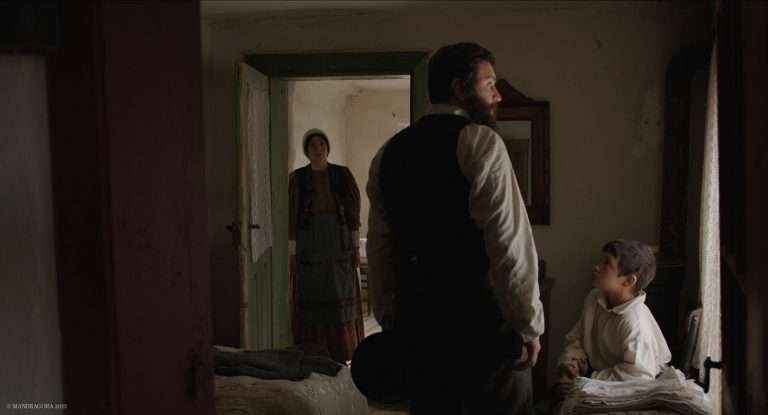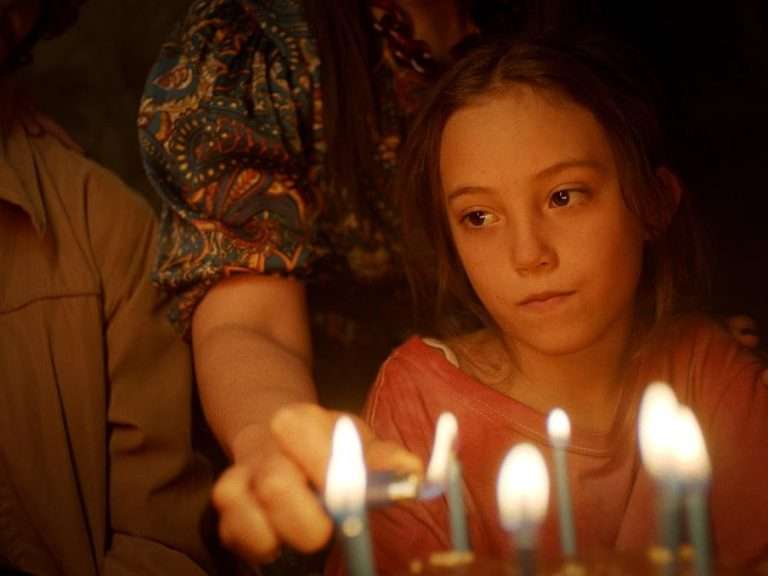In the last two years, two opposing forces have shone brightly in the landscape of Indian cinema. The unprecedented international success of director SS Rajamouli’s “RRR” (2022) has catapulted its lead actors into a level of worldwide fame previously reserved for the likes of Shah Rukh Khan and Amitabh Bachchan. International audiences took particular appreciation of Ram Charan, whose morally conflicted and complex character won widespread admiration. Yet, this excitement is tempered by the fact that Ram Charan has a relatively meager filmography, and of these, there are only a small number of phenomenal films, such as “Magadheera” (2009) or “Rangasthalam” (2018), a couple of good-to-decent films such as “Yevadu” (2014) or “Dhruva” (2016), and several outright stinkers like “Rachcha” (2012), the remake of Bachchan’s “Zanjeer” (2013), or the infamous “Vinaya Vidheya Rama” (2019).
Perhaps his biggest flop, 2022’s “Acharya”, was technically an extended cameo role and mercifully came and went before international audiences had fully latched onto “RRR”. Despite this, Charan’s star has never shone brighter, a fact reflected in his recent moniker change from “Mega Power Star” to “Global Star”.
On the other hand, director Shankar Shanmugam, once one of India’s most maverick commercial film directors, has seen a creative decline running almost as long as Charan’s entire acting career following the death of his frequent writing collaborator, the novelist Sujatha, in 2008. Despite setting box office records at the time with 2018’s “2.0”, the sequel to Sujatha’s final posthumous work, “Enthiran” (2010), the decline in Shankar’s creative appraisal by critics and audiences reached a shocking nadir with last year’s “Indian 2,” which is currently the lowest-rated film in the history of Tamil-language cinema on Letterboxd.com. Given that “Game Changer” and “Indian 2” were being worked on at roughly the same time, the cold reception of the latter boded poorly for the former.
“Game Changer” is an outdated, cliched, poorly written mess of a mass masala film that does nothing memorable or exceptional beyond echo scenes and elements from both Charan and Shankar’s previous works. It plays like an AI-generated summation of 2010s Telugu mass cinema, doing justice neither to Shankar’s typical grand ambitions nor to Charan’s formidable acting prowess. For Charan, who turns 40 in two months, “Game Changer” feels like a film he would have starred in a decade prior, except he is somehow still playing the same impulsive college student roles. A couple of months ahead of the release of “Game Changer”, director/writer Karthik Subbaraj, who is credited with its story, told the press, “[Game Changer] is not my vision but director Shankar’s.” It is eminently clear why Subbaraj, whose films are often praised for their sharp writing, would want to distance himself from this project.
Charan stars as district magistrate Ram Nandan, whose desire to clean up the Andhra Pradesh government starting from the first day of his appointment brings to mind immediate comparisons to Shankar’s own “Mudhalvan” (1999). However, while Shankar has been known for making films about angry young men fighting against government corruption, “Game Changer” focuses instead on Ram’s government position and the powers it legally holds. Far from the old stories of vigilantes using whatever means necessary to circumvent the corrupt system, “Game Changer” instead attempts to balance the weaponization of legal technicalities with the traditional mass film approach of using fisticuffs to solve problems.
Ram Nandan struggles with anger issues that cause him to lash out violently when he encounters injustice, an impulse curbed by the otherwise forgettable flowerpot character played by Kiara Advani. The focus on restraining his violent tendencies means that “Game Changer” underdelivers massively on any kind of interesting or engaging action setpieces. Charan, whose dexterous fight choreography in “RRR” remains some of the best in mass cinema, is restricted to the same plodding mass action style that is typically seen from actors in their 70s like Rajinikanth and Kamal Hassan. Instead of resolving issues with adrenaline-pumping action, he resorts to quibbling over legal minutiae with S.J. Suryah’s greedy minister character.
It becomes clear why Fahadh Fassil, the Malayalam actor who is often associated with wild, unhinged characters, made a deliberate attempt to steer away from similar roles in recent years, opting for a more restrained approach in movies such as “Bougainvillea” and “Vettaiyan.” S.J. Suryah has quickly become typecast as a similar kind of scenery-chewing, deranged villain character, including in Shankar’s own “Indian 2”. His talents as an actor are wasted, as is Charan’s, by the extreme one-dimensionality of their characters and the poor quality of the writing overall. Only Sunil brings the occasional smile as his gimmicky sideman Side Satyam.

The first block of “Game Changer” is weak as the audience waits for these characters to define themselves in some unique or memorable way. There is a flashback scene from a decade prior, in which Charan’s younger version of Ram Nandan plays exactly like his youthfully exuberant roles in “Magadheera” or “Yevadu”, bringing a dose of much-needed energy. The emotional stakes set up by the flashback are almost immediately made irrelevant once it ends, as Nandan’s ten-year quest to conquer his anger and become a more productive member of society reaches a tepid conclusion. It feels like a rushed, cheap imitation of the emotional conflicts experienced by Charan’s Alluri Raju in “RRR.” The interval twist, such as it is, brings further comparisons to “Mudhalvan,” robbing it of any real feeling of impact as it feels predictable and forced.
The catchphrase of Charan’s Nandan character, as established in the trailer for the film, is “I’m Unpredictable”, which becomes a source of unintentional comedy post-interval as the film proceeds down the most cliched and, yes, the predictable plot line for the rest of its duration. There is immediately a second flashback which proceeds to explain the story of Nandan’s father, Appanna, also played by Charan. This entire section has little reason to be in the film at all, as it establishes a motivation for Nandan that he doesn’t need, in order to take revenge against a character who at that point has already passed on. It also brings up numerous continuity issues, as many characters should have recognized Nandan as the spitting image of their beloved Appanna, who never commented on it until after the twist was revealed.
Furthermore, the entire Appanna backstory comes off as a poor imitation of Charan’s acclaimed Chitti Babu role from “Rangasthalam,” down to having a physical disability that impairs his ability to communicate, in this case, a marked stutter. Shankar’s trademark insensitivity to societal norms manifests itself here, as Chitti Babu’s deafness never formed the core of his character or his storyline, while Appanna’s stutter and his attempt to “fix” it becomes the character’s defining trait to the bitter end. When the film returns to the present day, Appanna’s presence is barely felt, as most of the characters who knew him have very few lines or are no longer present. This entire flashback concept was executed in a far superior way with Ram Charan’s character, also named Charan, from “Yevadu”, more than a decade prior.
The tit-for-tat between Nandan and Suryah’s Mopidevi continues as a battle of legal technicalities thrown back and forth. When Shankar expressed a desire to make his Telugu debut film in line with Telugu filmgoers’ expectations, it is unlikely that anyone expected or wanted this to manifest in the form of didactic monologues on the functions of government as have been widely criticized in recent Mahesh Babu films. A punch dialogue listing the various functions and responsibilities of the district magistrate position lands with all the fist-pumping impact of a grade school civics lesson.
Also Read: The 10 Best Malayalam Movies Of 2024
For example, the second half of the film is driven by a technicality that Nandan is ineligible to be CM without resigning as an IAS officer, which he cannot do because there is a standing complaint against him by Mopidevi, a complaint that is, for the record, completely justified. For a film that pivots on legal technicalities so often, logical gaps and inconsistencies that would normally be overlooked in a mass film become glaring plot holes that also create a disorienting inconsistency as to what the film’s message actually is.
Where previous Shankar movies championed and upheld the power of the common man who acts according to what is just over what is legal, “Game Changer” is the type of film that the establishment itself would make, one that remains within the legal boundaries of a governmental civil service position receives the most elevation of all, even as Appanna’s typical “politics for the people, not for money” stance is trotted out and then forgotten about.
This reaches a rather chilling point in the scene that plays over the film’s credit, in which Nandan proposes making voting compulsory, with electricity and water access being cut off for those who fail to uphold their voting responsibilities. This overtly fascist proposal being met with cheers and applause drags this film beyond mere mediocrity into feeling like a complete betrayal of the “people over government” politics that Shankar has historically been known for.
The much-heralded song sequences of “Game Changer” carry the typical Shankar maximalism and serve as the highest points of enjoyment the film has to offer. Incredibly, hit pre-release single “NaaNaa Hyraanaa” has been excised from the film entirely without prior notice, with promises being made after FDFS (first day, first show) screenings that it will be added back at a future date. Is this just a gimmick to attract audiences who would otherwise not be inclined to revisit this film during its theatrical run?
The one aspect of “Game Changer” that gives it a sense of personality is its usage of on-screen effects and dialogue aimed at the Instagram/TikTok/YouTube reels generation. These effects, while cute at times, are unlikely to reel in the younger demographic who will otherwise be bored by the preachy, outdated story that comes off as merely a glossier version of any mass film routinely encountered on TV.

Indeed, despite its inflated budget, there are numerous shoddy VFX shots and glaringly obvious green screen usage, with an utter dud of a climax that would have befitted a mid-budget Telugu mass film from 2012 and not one of the year’s biggest releases. The irony of this film being named “Game Changer” while bursting with every trite plot point and characterization under the sun is truly incredible. A more accurate title would have been “Channel Changer.”
The final part of this review contains spoilers for “Game Changer” and focuses on the subjective opinion of the reviewer and can be skipped if the reader is uninterested in either.
While “Game Changer” never rises beyond mediocrity on any level, there are a few artistic choices that dragged down its rating for me. The insensitivity towards persons with disabilities is most exemplified by Nandan’s mother Parvathy, played by Anjali, who resides in a home for those with serious disabilities after the trauma of witnessing Appanna’s murder. While she is described as having a severe mental disability, her behavior does not suggest this at all apart from her inability to look anyone directly in the eye.
Despite this, she is shown doing so at several points throughout the movie, usually for an attempt at dramatic effect. This is also supposedly the reason why she is unable to recognize Ram as her son despite hearing his voice, which is the same as his father’s aside from the stutter and standing directly next to him on multiple occasions. When there is an entire character whose gimmick is that he stands sideways and looks at everything out of the corner of his eyes, it seems ridiculous that Parvathy is somehow not capable of doing this.
There is a second problematic scene where Nandan is accused of having a bias toward the current political party due to his own parents’ involvement in that party which he did not disclose. This is a perfectly reasonable and accurate sentiment. For a film that so closely concerns itself with the legal system and also sets the precedent for Ram Nandan to follow in his father’s footsteps by being an honest leader who refuses to let politics corrupt him, the fact that Nandan proceeds to dismiss his own mother in front of the judiciary by claiming her to be too mentally unwell to give testimony should have been the downfall of his character. Instead, he makes a tearful apology later that night which seems to be the end of it. What follows is a plot beat that left a horrible taste in my mouth.
Having recently watched the Malayalam film “Marco” (2024), a film that is being both lauded and criticized for an extreme amount of seemingly callous violence, I was forced to reevaluate my perception of what gratuitous violence actually looks like. In “Marco,” a character is shown being dissolved in hydrofluoric acid, with numerous comments being made about the horrifically agonizing nature of such a death. In “Game Changer”, we are meant to believe that Parvathy voluntarily locates the nearest acid factory, breaks in, and jumps into a vat of sulfuric acid to escape a DNA test that would prove that Nandan is her son. The fact that Nandan drove his own mother to an intensely agonizing death by suicide is barely registered by the film.
Considering that Appanna’s death was caused by refusing to give up his morals and honesty, and the previous CM’s greatest regret on his deathbed was betraying Appanna’s ideals, for Nandan to ascend the CM seat by treating his own mother’s suicide as a necessary sacrifice is beyond belief. This made me reevaluate my own opinion of “Marco” as a film that examines the consequences and impacts of horrific violence in a way that modern filmmakers of family entertainers are somehow still willing to completely brush aside.
I was assuming that we would find that Parvathy only faked her death to allow her son to achieve his dream, but the film seems content to treat her in a way that even the worst mass film villain would never dream of treating his mother. The knowledge of this senselessly cruel and unwarranted story beat irrevocably taints the rest of the film for me personally.


![A White, White Day (Hvítur, Hvítur Dagur) [2019]: ‘TIFF’ Review – A Cold Soul Longing for an Answer](https://79468c92.delivery.rocketcdn.me/wp-content/uploads/2019/09/A-White-White-Day-768x384.jpg)

![Taming the Garden [2021] ‘MUBI’ Review: An Anger-inducing Synecdoche for Human evolution](https://79468c92.delivery.rocketcdn.me/wp-content/uploads/2022/01/Taming-the-Garden-2021-768x432.jpeg)

